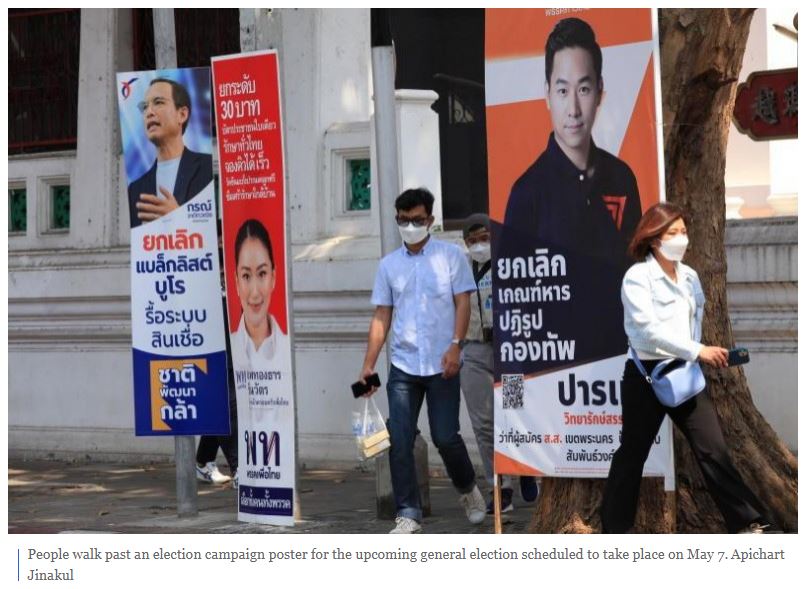Thailand: Executives list policy priorities
The upcoming general election slated for May 7 is sparking speculation on a potential successor to Prime Minister Prayut Chan-o-cha as well as new economic policies that might be promoted by an incoming government.
Business leaders have begun to chime in on what they believe could help the country survive economic challenges this year after Gen Prayut told the House of Representatives that parliament would be dissolved in early March.
From tourism, wages and digital-related topics, which are always in the media spotlight, to issues related to steel that are crucial but appear less frequently in the headlines, company executives voiced their concerns and put forward suggestions for the next government to jointly shape a new look for Thailand.
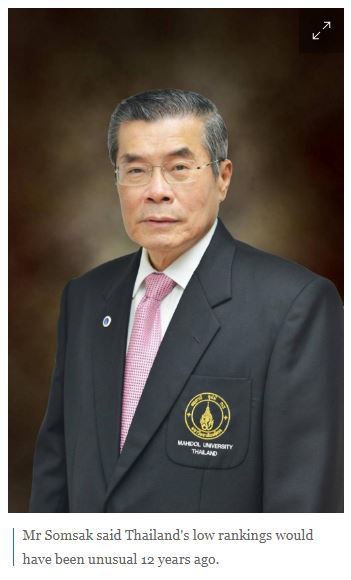 STEEL BACKBONE
STEEL BACKBONE
The new government must build a stronger domestic steel industry as part of attempts to enhance national economic security, said Somsak Leeswadtrakul, a leading steel entrepreneur, executive director of the Iron and Steel Institute of Thailand, and contributor to educational and social welfare causes.
A better steel policy is badly needed because the domestic industry is in a “worrisome situation” and produces less than neighbouring countries, said Mr Somsak, who is also honorary chairman of G Steel Group, one of the largest producers in Thailand.
Thailand has the potential to produce large quantities of steel, but now buys most of it from abroad, with net imports tallying 13 million tonnes a year, making it the world’s second-largest steel importer.
This happened because Thailand could not cope with the dumping of cheap steel in domestic markets, causing many local steel factories to close, he said.
“This is a serious risk to national economic security,” said Mr Somsak.
“If any unexpected negative incidents in the global steel supply occur, Thailand may encounter hindrances in developing its infrastructure or even protecting the country, not to mention the impact to other industries that rely on steel.”
Capacity utilisation in Thailand’s steel industry is very low. Last year the country manufactured 7.1 million tonnes of steel, only 33% of its total capacity of 21.5 million tonnes per year.
He said 5.3 million of the 7.1 million tonnes produced were crude steel, accounting for 0.28% of global crude steel production. This makes Thailand 30th in the world and fourth in Asean in production of crude steel.
Vietnam is No.1 in Asean, producing 20 million tonnes of crude steel last year, followed by Indonesia (15.6 million) and Malaysia (10 million).
Mr Somsak said Thailand’s low rankings would have been unusual 12 years ago.
In 2010, the country was the leader in Asean, producing 3.7 million tonnes of crude steel, while Indonesia’s output was 3.6 million tonnes, followed by Vietnam with 2.7 million.
“The new government must have the courage to protect the domestic steel industry against dumping,” he said.
Thailand uses only one anti-dumping measure in its efforts to keep out cheap steel. Mr Somsak said authorities need to use a mixture of instruments, including anti-countervailing duties, circumvention and safeguarding in order to better protect local steel manufacturers.
Entrepreneurs have invested up to 400 billion baht in the domestic steel industry, which plays a key role in directly and indirectly creating jobs for more than 200,000 workers.
He said new policymakers must also promote the use of locally-made steel in state and private projects, restructure the steel industry by solving overcapacity problems in some areas of production, and develop a steel supply chain.
As the world focuses on taking better care of the environment, Mr Somsak suggested the government use eco-friendly steel manufacturing and renewable energy, in tandem with maintaining manufacturers’ competitiveness.
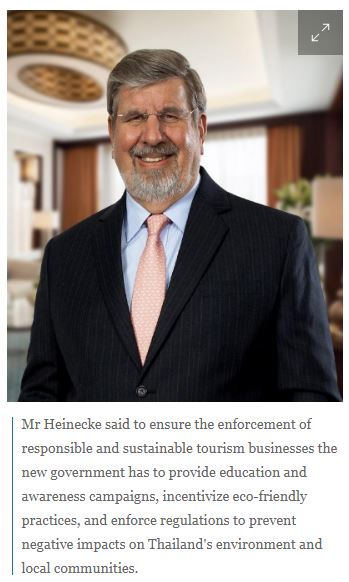 BOOSTING TOURISM
BOOSTING TOURISM
William Heinecke, chairman of Minor International Plc, said he expects the next administration to accelerate the increase of overseas flight capacity, especially between Thailand and China, by incentivising airlines to operate more flights to the country in order to spur tourism.
The government also needs to invest in infrastructure development to enhance the country’s tourist facilities, such as airports, roads, public transport systems, and tourist accommodation, to provide a seamless travel experience for visitors.
He said another priority is funding for the improvement of tourist destinations, such as historical sites, cultural attractions and natural wonders, in addition to investing in promoting the country’s medical tourism by supporting medical R&D, raising awareness about and the quality of medical services and facilities in Thailand, as well as improving medical accessibility for tourists.
To ensure responsible and sustainable tourism enterprises, Mr Heinecke said the new government should offer education and awareness campaigns, incentivise eco-friendly practices, and enforce regulations to prevent negative impacts to the country’s environment and local communities.
He said the government needs to promote initiatives to reduce air pollution by enforcing emissions standards for transport and industry, encourage renewable energy, and incentivise eco-friendly practices.
Efforts should include focusing on clean oceans by implementing regulations to prevent marine pollution, increasing the quality of visitation as opposed to the quantity of visitors, and supporting initiatives to reduce ocean waste, said Mr Heinecke.
According to the Thai Chamber of Commerce, businesses in the tourism sector are beginning to recover as foreign arrivals keep growing.
There are signs arrivals this year could exceed the growth posted last year, according to the chamber.
A major challenge that still needs to be addressed is the labour shortage in the tourism and service sectors, as many businesses laid off workers and froze recruitment during the pandemic.
Business owners must have a plan to recruit sufficient staff to ensure their operations can fully recover, said the chamber.
UNHEALTHY SITUATION
Ratanada Choobal, president of the Health and Wellness Phuket Spa Association, said in addition to helping tackle the labour shortages in the tourism sector, the next administration also needs to address a manpower deficit in the health and wellness sector.
She said the next government should focus on creating more skilled workers to offset those who left the industry during the pandemic, especially because a key tourism destination such as Phuket is already making a recovery.
Although 70% of spa businesses have resumed their operations, they are operating with 50% of their regular level of employees following the pandemic, said Mrs Ratanada.
“Many operators are headhunting for spa therapists. Moreover, therapists often work for more than one branch,” she said.
“Sometimes customers cannot get a spa booking.”
Of almost 10,000 spa therapists listed at the Phuket Provincial Public Health office, fewer than 50% have returned to their jobs, said Mrs Ratanada.
She urged related authorities, such as the Employment and Skill Development departments, to solve this problem by working closely with the private sector.
Spa operators can help train new employees or those looking for a second job by offering them a 150-hour course, which would grant them certificates after completing their studies.
The government could try to attract workers via job fairs, said Mrs Ratanada.
She said the next government should also prioritise improving roads and transport on the island to accommodate tourist flow in Phuket, as well as help control the rising price of electricity bills, a major expense for spas and hotels.
LOW-INCOME FOCUS
Somchai Lertsutiwong, chief executive of Advanced Info Service (AIS), declined to comment on the potential of the next government. However, his personal preference lies with policies that vow to increase the daily minimum wage as this would directly help low-income people better deal with the increasing cost of living.
Political candidates vying to become MPs must consider promoting benefits for low-income people as their first priority, he said.
Mr Somchai said large corporations and enterprises weathered the pandemic challenge despite several critical obstacles during that period because they benefit from economy of scale and efficient operational management.
In contrast, he said small businesses and consumers — particularly low-income people — stand to suffer from many factors, including inflation, waning purchasing power and high interest rates.
Takit Chardcherdsak, assistant vice-president at Kasikorn Securities, said brokerage analysts would like to see an adjustment to the minimum wage for workers in all occupations to increase their purchasing power, enabling them to deal with the high cost of living, driven by the Russia-Ukraine war and the economic impact of the pandemic.
The price of WTI crude oil peaked at UScopy25 per barrel during the Russia-Ukraine conflict, though it dropped to $75 per barrel at present.
However, the prices of goods and electricity have not decreased, resulting in the high cost of living, he said.
Any increase in wages could take place gradually so as not to affect the costs of corporate operations, said Mr Takit.
The new government should also consider reducing corporate tax to increase business competitiveness and expansion, as well as reducing individual income tax to increase purchasing power, he said.
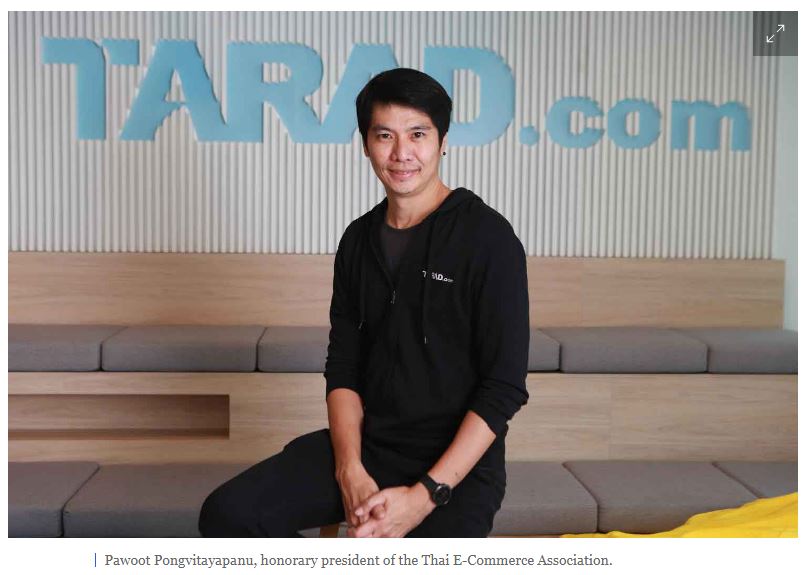 REDUCING THE DIGITAL DEFICIT
REDUCING THE DIGITAL DEFICIT
Pawoot Pongvitayapanu, honorary president of the Thai E-Commerce Association, said political parties should pay heed to efforts to curb the country’s digital deficit as Thailand hands over roughly 200 billion baht per year to pay for digital services to large foreign digital service platforms.
The next government should promote the creation of more local digital service providers to give consumers more choices, he said.
Mr Pawoot said local companies spend around 20-30 billion baht posting online ads on various foreign social media platforms, but the country can only claw back revenue from these platforms via the e-service tax channel.
The country should seek ways to earn more revenue from these platforms rather than allowing them to send huge sums back to their headquarters, he said.
Moreover, the next government needs to implement measures to prevent Chinese products that do not meet safety standards from flooding the Thai market via the major online e-commerce platforms, Mr Pawoot said.
For example, some LED bulbs from China are priced at 20 baht, but they do not comply with Thailand’s safety standards. At this price, the Chinese products often sell better than locally produced bulbs that received safety certification, he said.
In addition, some Chinese manufacturers now have warehouses in Thailand, enabling them to ship products faster to local buyers, said Mr Pawoot.
To create some balance, he said Thailand needs to export more to China via online platforms. This may require “e-commerce export enablers” to assist local exporters in facilitating such exports.
Supak Lailert, president of the Association of Thai ICT Industry, suggested the next government take a look at two areas.
First, the government should look at further development of the innovation and startup structure to help local startups grow as some of them opt to register in Singapore for tax benefits and easier access to capital, he said.
Second, the government should allocate a bigger budget to support the development of the national cybersecurity infrastructure facilities to better deal with increasing cybersecurity threats, said Mr Supak.
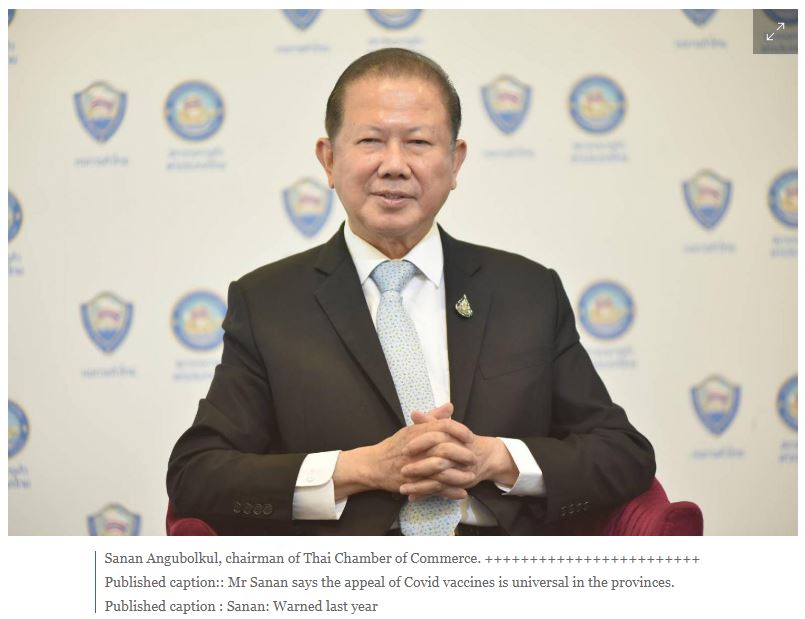 POLICY EVALUATION REQUIRED
POLICY EVALUATION REQUIRED
Sanan Angubolkul, chairman of the Thai Chamber of Commerce, said any policies or measures pushed by political parties in the campaign, especially those pertaining to people’s lives, should be evaluated for their effectiveness as well as positive and negative impacts.
He said the private sector wants policy proposals that do not generate any financial burden for the country’s coffers over the long run.
Policies should emphasise job creation and long-term income generation for the people, rather than simply distributing money as a form of short-term assistance or populist sops that create a burden on the government or private sectors, said Mr Sanan.
Parties must respond to public questions clearly in terms of the funding for their policies, whether the policies would affect the country’s financial stability, and the value and benefits the policies would create for the country in terms of social and economic development, competitiveness and sustainability, he said.
Read more: https://www.bangkokpost.com/business/2515804/executives-list-policy-priorities


 Thailand
Thailand




